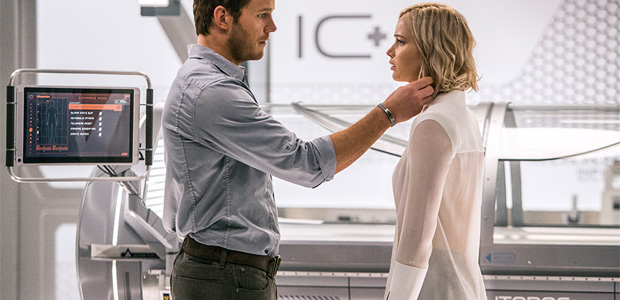There is a lot to appreciate about director Morten Tyldum's Passengers. On beyond the fact that it's legitimately rare to see an original, intimate, flashy sci-fi feature in modern Hollywood, it's also a film that raises interesting morality questions while being driven by great performances from two of the industry's best talents. The problem, however, is that this is exclusively an apt description of the first two-thirds of the movie, as when the film starts rounding into its third act, it also decides to completely abandon everything interesting that it has going for it -- instead devolving into little more than typical action blockbuster blandness that fails to address the big questions that it has beautifully sets up.
Because giving away too many details of the story would significantly hamper an audiences experience (and because the marketing has done a good job keeping certain secrets), I'll be a bit vague in my description of the plot -- but know that there is more to it. Based on a screenplay by John Spaihts, the narrative is entirely set on a giant spaceship called the Avalon that is carrying 5000 hibernating passengers on a 120-year journey to a world where they can all start brand new lives for themselves. Unfortunately, an errant trip through an asteroid field results in certain systems being damaged, and with approximately 90 years left on the expedition, Jim (Chris Pratt) and Aurora (Jennifer Lawrence) find themselves awake and with no way to contact anybody, go back to sleep, or leave the vessel. With nobody but each other and a friendly android bartender named Arthur (Michael Sheen), they must not only figure out how to live in their new existence, but as the ship continues to malfunction, also find a way to save the lives of everybody on board.
Passengers is at its most compelling and interesting when its operating at its smallest scale, where it's really able to exploit the best elements of the sci-fi genre -- using out-of-the-box ideas to explore the details of humanity. Before Aurora arrives on the scene, Jim spends an entire year on the Avalon alone, and thanks to a fantastic performance from Chris Pratt, it manages to be everything from funny to scary to tragic as it captures what that experience might be like with surprising verisimilitude. Then, when Aurora does show up, her presence brings with it a whole mess of ethical dilemmas and issues that movie-goers will both be engrossed with while watching the film, and also while talking about in through examination once it's over (not to mention the fact that Pratt and Jennifer Lawrence have dynamite chemistry together).
A big part of the reason why these examinations will be interesting is because Passengers doesn't fully resolve any of them itself -- instead using the third act to direct focus entirely to the failing ship and saving the lives of everybody on board. To the movie's credit, it does set up some terrific and beautiful set pieces -- created with a surprising mix of practical and digital -- but it also feels shallow following all of the fascinating ideas being thrown around in the preceding 90 minutes. Also really hurting the movie is that it never really tries to build up any sense of mystery surrounding the cause of the failing ship (see asteroid field mentioned above), and it really feels like a missed opportunity that could have not only added some much needed depth and suspense to the final act, but that could have added an entirely new twist to the narrative as a whole.
By the time Passengers hits its underwhelming finale, you almost wish that it didn't start out so strong, just because it's basically all a set up for disappointment. There are so many things that go right with the film -- from its stars performances to really beautiful and creative production design -- but its legitimate failure to stick the landing both leaves a bad taste in your mouth, and actually compromises its internal ethics in a sour way. It's worth seeing for its big ideas and interesting concept, but also ultimately less than the sum of its parts.

Eric Eisenberg is the Assistant Managing Editor at CinemaBlend. After graduating Boston University and earning a bachelor’s degree in journalism, he took a part-time job as a staff writer for CinemaBlend, and after six months was offered the opportunity to move to Los Angeles and take on a newly created West Coast Editor position. Over a decade later, he's continuing to advance his interests and expertise. In addition to conducting filmmaker interviews and contributing to the news and feature content of the site, Eric also oversees the Movie Reviews section, writes the the weekend box office report (published Sundays), and is the site's resident Stephen King expert. He has two King-related columns.











